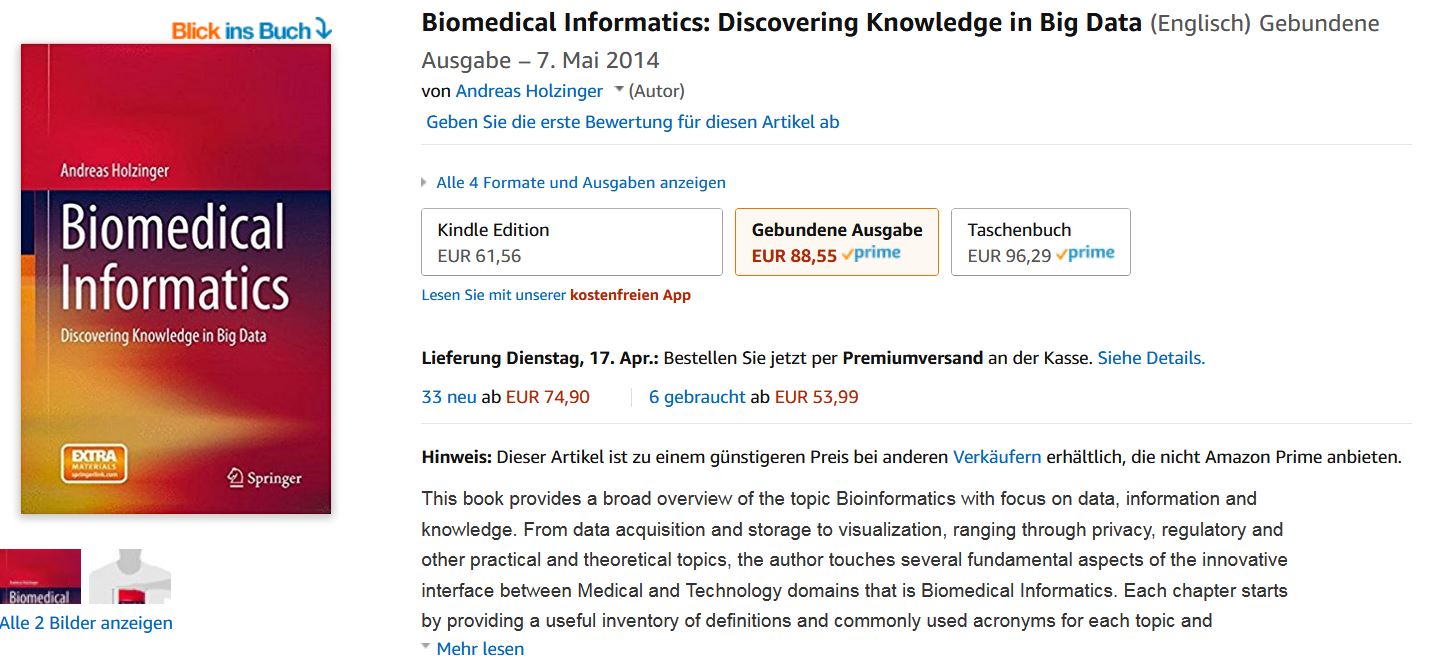Mini Course
From Data Science to Interpretable AI (class of 2019)
“It is remarkable that a science which began with the consideration of games of
chance should have become the most important object of human knowledge”
Pierre Simon de Laplace, 1812.
Summer Term 2019 (crash course on Monday, June, 17, 2019)
Short Description: This Mini course is an introduction into a core area of health informatics: decision making and how human intelligence can be augmented by Artificial Intelligence (AI) and Machine Learning (ML) (-> What is the difference between AI/ML?). The lecturer, Andreas Holzinger, has taught this course in various versions, variations and lenght since 2005. A special focus is given on interpretable AI and ethical-responsible machine learning due to its importance for the health domain.
This page is valid as of June, 17, 2019, 09:00 CET
Welcome
0) If you need a refresher study the primer on your own
1) Read the introduction paper:
HOLZINGER (2016) Machine Learning for Health Informatics.
2) German speaking students can additionally read this :
https://link.springer.com/article/10.1007/s00287-018-1102-5
3) An introduction into Explainable-AI for the medical domain:
https://arxiv.org/abs/1712.09923
4) Introduction video:
https://www.youtube.com/watch?v=lc2hvuh0FwQ
5) Attend class and enjoy the coffee breaks
6) Take the exam successfully!
Module 00 – Primer on Probability and Information (optional)
Topic 00: Mathematical Notations
Topic 01: Probability Distribution and Probability Density
Topic 02: Expectation and Expected Utility Theory
Topic 03: Joint Probability and Conditional Probability
Topic 04: Independent and Identically Distributed Data (IIDD)
Topic 05: Measuring Probabilities: Bayes and Laplace
Topic 06: Measuring Information: Kullback-Leibler Divergence and Entropy
Lecture slides 2×2 (10,300 kB): https://human-centered.ai/seminar-explainable-ai-2019/
Reading for students:
David J.C. Mackay 2003. Information theory, inference and learning algorithms, Boston (MA), Cambridge University Press.
Online available: https://www.inference.org.uk/itprnn/book.html
Slides online available: https://www.inference.org.uk/itprnn/Slides.shtml
Note: The Slides below are for printing and reading, the slides during the lecture are different due to didactical reasons
Module 01 – Introduction to Artificial Intelligence (AI) and Machine Learning (ML)
Topic 01: What is Human-Centered AI (HCAI) ?
Topic 02: Why is Health Informatics complex?
Topic 03: Probabilistic Learning
Topic 04: Automatic Machine Learning (aML)
Topic 05: Interactive Machine Learning (iML)
Topic 06: Why Explainability?
Lecture slides (full size, 5,460 kB): 1-INTRO-MiniCourse-2019-06-17-HOLZINGER-print
Lecture slides (2 x 2, 5,229 kB): 1-INTRO-MiniCourse-2019-06-17-HOLZINGER-print-2×2
Module 02 – Data, Information and Knowledge Representation
Topic 00 Reflection Quiz – follow-up from last lecture
Topic 01 What is data? The underlying physics of data
Topic 02 Medical Communication
Topic 03 On Standardization
Topic 04 Knowledge Representation
Topic 05 Biomedical Ontologies
Topic 06 Medical Classifications
Lecture Slides (full size, 8,815 kB): 2-DATA-MiniCourse-2019-06-17-HOLZINGER-print
Lecture Slides (2 x 2, 6,714 kB): 2-DATA-MiniCourse-2019-06-17-HOLZINGER-print-2×2
Module 03 – Decision Making and Decision Support
Topic 00 Reflection Quiz – follow-up from last lecture
Topic 01 Medical Action = Decision Making
Topic 02 Can AI help doctors to make better decisions?
Topic 03 History of Decision Support Systems (DSS) = History of AI
Topic 04 Example P4 medicine
Topic 05 Example Case Based Reasoning (CBR)
Topic 06 Human Information Processing
Topic 07 Probabilistic Decision Making
Lecture Slides (Full size, 5,516 kB): 3-DECISION-MiniCourse-2019-06-17-HOLZINGER-print
Lecture Slides (2 x 2, 7,500 kB): 3-DECISION-MiniCourse-2019-06-17-HOLZINGER-print-2×2
Module 04 – From Expert Systems to Explainable AI
Topic 00 Reflection Quiz – follow-up from last lecture
Topic 01: Causality and Decision Making
Topic 02: Causal Reasoning
Topic 03: Explainability
Topic 04: Methods of Explainable AI
Topic 05: Conlcusion: Human-in-control
Lecture slides (Full size, 2,225 kB): 4-EXPLANATION-MiniCourse-2019-06-17-HOLZINGER-print
Lecture slides (2 x 2, 4,038 kB): 4-EXPLANATION-MiniCourse-2019-06-17-HOLZINGER-print-2×2
Short Bio of Lecturer:
Andreas Holzinger promotes a synergistic approach to Human-Centred Artifical Intelligence (HCAI) and has pioneered in interactive machine learning (iML) with the human-in-the-loop. Andreas’ goal is to augment human intelligence with artificial intelligence to help to solve problems in health informatics always with the human-in-control.
Due to raising legal and privacy issues in the European Union AI must be made transparent, re-traceable, thus understandable. Andreas’ aim is to explain why a machine decision has been made, paving the way towards explainable AI and Causability.
Andreas Holzinger is lead of the Holzinger Group, HCAI, Institute for Medical Informatics/Statistics at the Medical University Graz, and Associate Professor of Applied Computer Science at the Faculty of Computer Science and Biomedical Engineering at Graz University of Technology. He serves as consultant for the Canadian, US, UK, Swiss, French, Italian and Dutch governments, for the German excellence initiative, and as national expert in the European Commission. His is in the advisory board of the Artificial Intelligence Strategy AI made in Germany 2030 of the German Federal Government and in the advisory board of the Artificial Intelligence Mission Austria 2030.
Andreas obtained a Ph.D. in Cognitive Science from Graz University in 1998 and his Habilitation (second Ph.D.) in Computer Science from Graz University of Technology in 2003. Andreas was Visiting Professor for Machine Learning & Knowledge Extraction in Verona, RWTH Aachen, University College London and Middlesex University London. Since 2016 Andreas is Visiting Professor for Machine Learning in Health Informatics at the Faculty of Informatics at Vienna University of Technology.
Since 2003 Andreas has participated in leading positions in 30+ R&D multi-national projects, budget 6+ MEUR, 300+ publications, 11k+ citations, H-Index = 48.
Video for Students: https://youtu.be/lc2hvuh0FwQ
Group Homepage: https://human-centered.ai/
Personal Homepage: https://www.aholzinger.at/
GitHub page: https://github.com/human-centered-ai-lab
Google Scholar: https://scholar.google.com/citations?hl=en&user=BTBd5V4AAAAJ&view_op=list_works&sortby=pubdate
Additional study material:
Course Biomedical Informatics – Discovering Knowledge in (big) data (1 semester – 12 lectures – 3 ECTS):
https://human-centered.ai/biomedical-informatics-big-data/


